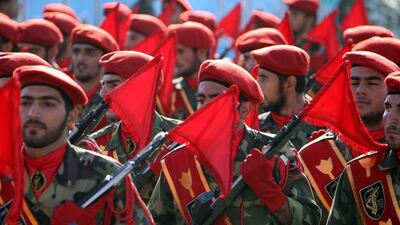No nuclear deal could have been possible between Iran and the P5+1 group of countries without the support of Ayatollah Ali Khamenei, Iran’s supreme leader, and the Revolutionary Guard. Step-by-step they worked in the background in Tehran to orchestrate the ongoing negotiations in Vienna.
Some Iranian hardline conservatives have described the accord as a capitulation to western interests. Sceptics in the West, meanwhile, wonder how Iran will apply the deal’s terms and what happens when violations occur.
To calm domestic fears, the supreme leader made assurances in a recent Friday sermon. His statement was loaded with double meanings. On the one hand, he promised not to go to war against America unless a conflict was initiated by the US. On the other, he reassured his audience that Tehran’s policy towards the US remains unchanged.
A pro-Iranian source in Beirut told me that the speech was directed at young Iranians eager to end international isolation. Khamenei, meanwhile, wants to go cautiously forward.
For now, there is a jovial mood in Tehran, as economic delegations pour into the city from Europe, America and Asia to sell expertise and gain lucrative contracts.
The Revolutionary Guard are prime movers in the Iranian economy and manage enterprises in a variety of sectors. They run the oil, gas and weapons industries. The Guard was set up in 1979 by Ayatollah Ruhollah Khomeini, the architect of the shah’s downfall and the founder of the Islamic Republic. He envisaged it as a counterweight to prevent the army from mounting a coup to reinstate the deposed monarch.
When the republic was in its infancy, Saddam Hussein sent the Iraqi army sweeping across the border hoping to take advantage of the internal chaos.
Volunteers, often teenagers and young men in their 20s, fought for eight years in the brutal Iraq-Iran war that began in September 1980.
More than a million Iranians were killed as the two sides fought to a stalemate. Qassem Suleimani, the present commander of the Al Quds force, was a young recruit back then and was known for his reconnaissance missions behind Iraqi lines.
Khomeini decided after the Iraq-Iran war that Tehran must wage asymmetrical warfare through the Revolutionary Guard, attacking foreign powers and their interests.
The force was an ideal tool to export the revolution and exercise power. Lebanon was the first victim of this tactic when Iranians created Hizbollah, a Shia force trained, funded and armed by Tehran.
The Guard's huge sacrifices on the battlefield in the Iran-Iraq war made it an indispensable force that whoever rules Tehran could not ignore. Its top generals have been rewarded generously, and have been named to run ministries and serve as advisers to leading mullahs. They now operate at all levels of society.
As such, they stand to acquire the lion’s share of the coming bounty. They will also seek to expand, update and modernise their network of industrial complexes. They see the deal as a window of opportunity to boost the economy, raise the standards of living for average Iranians, cut the unemployment rate and decrease crippling inflation.
In a way they are “a state within the state or complementary to the state”, according to Dr Talal Atrissi, a professor at the Lebanese University in Beirut.
There is a big debate in Iran over how the windfall from the removal of sanctions will be spent. Will it be used on internal development or on external military adventures to create spheres of influence in the Middle East?
In spite of its dire economic circumstances during the worst of the sanctions era, Iran was still able to fund, train and support military groups like Hizbollah in Lebanon, Hamas in Palestine and the Houthis in Yemen, as well as continue to support the Assad regime in Syria.
The nuclear deal fails to address the expansion of the Iranian revolutionary model and the exporting of its Wilayet el Faqih political doctrine, focusing instead on the narrow terms of the nuclear containment.
As the Revolutionary Guard is the primary instrument of expansion of the Shia crescent in the Middle East, many observers fear the lifting of sanctions will be used to accentuate the appetite to launch more military campaigns to threaten established regimes. Especially as it effectively recognises Iran as a “legitimate” super power in the region.
The question now is who or what does the Revolutionary Guard have its sights set on in the post-nuclear accord world?
Maha Samara is a journalist in Beirut

